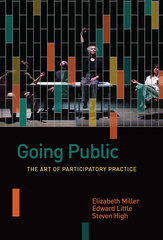
Oral History at the Crossroads
Sharing Life Stories of Survival and Displacement
Over a span of seven years, hundreds of people displaced from their countries of origin by mass violence volunteered to tell their stories to the Montreal Life Stories project. Their stories provide crucial insights into the causes and experiences of crimes against humanity and into how such violence is remembered. The project not only gathered interview material as a record and a rich set of primary sources, it also challenged long-held beliefs about how oral stories should be recorded, who has the authority to collect them, and how they can be shared.
Using the Montreal Life Stories project as an example of collective storytelling, Oral History at the Crossroads rejects the idea that there must be “critical distance” between researchers and their subjects. Instead, this book provides an alternative model to traditional research practice, one where community members “share authority” as equal partners at all stages of a project – from its inception to its conclusion. The experiences of those who participated in the Montreal Life Stories project are richly illustrated by more than a hundred photographs highlighting the intersections between oral history, digital media, and performance.
A sustained reflection on the methodology and ethics in multi-layered, collaborative research, Oral History at the Crossroads has methodological and ethical implications for scholars. And, as a contemporary model for curating oral and public history, this book pushes the field in new directions.
This book will be of interest to oral and public historians; researchers engaged in collaborative research (particularly community-university collaboration); teachers of research methods and ethics; specialists in Holocaust, Genocide, Memory, and Refugee studies; sociologists; and specialists on Quebec, Rwanda, and Haiti.
Awards
- 2015, Winner - CLIO Prize for Quebec, Canadian Historical Association
This book represents an important intervention in the field of oral history. It provides significant insights from a major oral history project that will have lasting influence on both refugee studies in Canada and oral history programming internationally.
In this beautifully written book, Steven High describes and interprets evocative examples of what happens after the interview, as he explores the regenerative possibilities for displaced people to create new livelihoods and communities in the aftermath of mass violence.
Introduction
Part 1: Mutual Sightings
1 Interviewing Survivors
2 A Flower in the River
3 Bearing Witness
4 Regenerative Possibilities
5 Remembering Haiti
6 Smile through the Tears
Part 2: Curating Life Stories
7 Sharing Stories
8 Walking the City
9 Oral History and Performance
10 Blurred Boundaries
Conclusion
Appendices
Notes
Bibliography
Index











